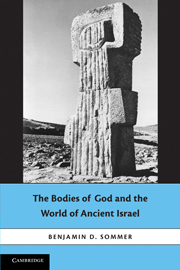Book contents
- Frontmatter
- Contents
- Preface
- Acknowledgments
- Introduction: God's Body and the Bible's Interpreters
- 1 Fluidity of Divine Embodiment and Selfhood: Mesopotamia and Canaan
- 2 The Fluidity Model in Ancient Israel
- 3 The Rejection of the Fluidity Model in Ancient Israel
- 4 God's Bodies and Sacred Space (1): Tent, Ark, and Temple
- 5 God's Bodies and Sacred Space (2): Difficult Beginnings
- 6 The Perception of Divinity in Biblical Tradition: Implications and Afterlife
- Appendix: Monotheism and Polytheism in Ancient Israel
- Notes
- List of Abbreviations
- Bibliography
- Scriptural Index
- Index of Rabbinic Citations
- Subject Index
3 - The Rejection of the Fluidity Model in Ancient Israel
Published online by Cambridge University Press: 15 September 2009
- Frontmatter
- Contents
- Preface
- Acknowledgments
- Introduction: God's Body and the Bible's Interpreters
- 1 Fluidity of Divine Embodiment and Selfhood: Mesopotamia and Canaan
- 2 The Fluidity Model in Ancient Israel
- 3 The Rejection of the Fluidity Model in Ancient Israel
- 4 God's Bodies and Sacred Space (1): Tent, Ark, and Temple
- 5 God's Bodies and Sacred Space (2): Difficult Beginnings
- 6 The Perception of Divinity in Biblical Tradition: Implications and Afterlife
- Appendix: Monotheism and Polytheism in Ancient Israel
- Notes
- List of Abbreviations
- Bibliography
- Scriptural Index
- Index of Rabbinic Citations
- Subject Index
Summary
In the theological intuition that has concerned us was found among the polytheists of the ancient Near East and also among worshippers of Yhwh in ancient Israel: A god – even the one God – could have many bodies and a fluid self. Israelites who accepted this premise included the biblical authors responsible for the Pentateuch's JE narratives and various scribes and poets with some connection to the northern kingdom. Other Israelites, however, rejected these notions. Certain streams of tradition in the Hebrew Bible display no sense that divine selfhood could fragment. These same traditions regard divine embodiment as fixed, and they strongly condemn the stelae and ʾasherahs so crucial to the notion of multiplicity of divine embodiment. I focus the discussion in this chapter on two such streams of tradition: deuteronomic texts and priestly texts. (By “deuteronomic texts,” I mean both the Book of Deuteronomy and the historical works that reflect its ideology: to wit, Joshua, Judges, Samuel, and Kings. The term “priestly texts” for the purposes of this book include all the priestly material in the Pentateuch – both the older PT scrolls and the later HS additions to them; when referring to this priestly material in its final form, I sometimes use the siglum “P.” I also use the term “priestly texts” to refer to the Book of Ezekiel, because Ezekiel was a priest and his book's ideological and stylistic affinity to priestly texts in the Pentateuch are well known.)
- Type
- Chapter
- Information
- The Bodies of God and the World of Ancient Israel , pp. 58 - 79Publisher: Cambridge University PressPrint publication year: 2009



